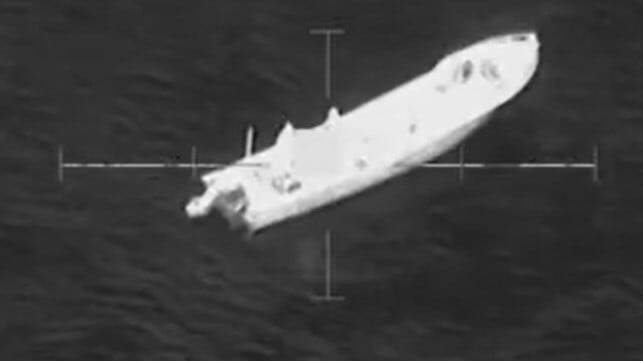U.S. Military Kills Six More Drug Smuggling Suspects in Two Boat Strikes

The U.S. military has carried out two more strikes on suspected drug boats in the Eastern Pacific, according to the Pentagon.
In a statement, the department said that two boats were eliminated, each carrying three male suspects. All were killed in airstrikes in international waters, at no risk to U.S. servicemembers.
Yesterday, at the direction of President Trump, two lethal kinetic strikes were conducted on two vessels operated by Designated Terrorist Organizations.
— Secretary of War Pete Hegseth (@SecWar) November 10, 2025
These vessels were known by our intelligence to be associated with illicit narcotics smuggling, were carrying narcotics, and… pic.twitter.com/ocUoGzwwDO
The military has now conducted a total of 19 strikes on suspected drug boats, bringing the total number of deceased suspects to 76 people. Two survivors were rescued after a strike in mid-October and returned to Colombia and Ecuador, their respective nations.
The Trump administration describes the targets as "narco-terrorists" or "cartel terrorists," and claims that the boats are "known to our intelligence" to be involved in narcotics smuggling. Anecdotally, reporters who have interviewed relatives and acquaintances of the deceased boat operators have found that most are low-income individuals with limited economic options. Among the dead are commercial drivers, fishermen, laborers, petty criminals, and at least one local crime boss, according to the AP.
The Pentagon has not disclosed the identities of those eliminated in the strikes, if any are known. The majority of the deceased remain unidentified, according to MSNBC, consistent with the secretive nature of smuggling enterprises and the remoteness of the waters where they were killed.

that matters most
Get the latest maritime news delivered to your inbox daily.
The legality of the strike program has been questioned by political critics, legal experts and even the United Nations' top human rights official. Even if these matters are set aside, there is the more practical matter of efficacy: some smuggling experts question whether the flow of drugs can be stopped with airstrikes on low-level "mules." Even if the attacks make the established boat routes too risky, the loosely-organized South American crime networks have a long history of developing alternatives, like complex container freight strategies and foot traffic.
"I don’t think it’s going to cause the [Jalisco New Generation Cartel] or Sinaloa cartel to say, ‘Wait, this is too dangerous,'" one congressional official told MSNBC. "These guys feed their rivals to tigers. They are not easily intimidated."
